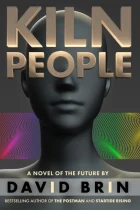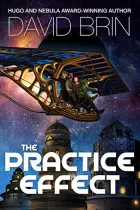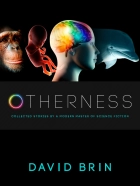 Most of us in the west were raised with legends, myths and movies that taught Suspicion of Authority (SoA). Thanks to the great science fiction author, George Orwell, we share a compelling metaphor — Big Brother — propelling our fears about a future that may be dominated by tyrants.
Most of us in the west were raised with legends, myths and movies that taught Suspicion of Authority (SoA). Thanks to the great science fiction author, George Orwell, we share a compelling metaphor — Big Brother — propelling our fears about a future that may be dominated by tyrants.
Whether they emerge from Big Government or a corporate oligarchy or the traditional feudalism of inherited wealth, it is the end result most of us dread… a return to the brutal, pyramid-shaped social order that dominated 99% of human societies — only now empowered by fantastic powers of technological surveillance and enforcement.
Finding ways to escape that fate – and instead preserve this narrow, fragile renaissance of freedom – is the common goal of activists across the spectrum. Though we are hobbled in this effort by the “spectrum” itself, whose artificial divides make us deride potential allies, proclaiming simplistic, spasmodic prescriptions.
Nowhere is this sad reflex more prevalent than in the lobotomized modern debate over how to handle information.
== The Indignant Reflex ==
Peter Watts is a very good author (Blindsight and the upcoming Echopraxia) and a clever fellow. But when he weighed in, recently, about privacy and surveillance, his core argument was nonsensical, even in its own context. The Watts manifesto for a “Scorched Earth Society” is satisfyingly militant-sounding — enough-so to excite the tech-dazzle showman, Cory Doctorow, praising Peter from his Boing Boing pulpit, and Angelique Carson, who blogs at the site of the International Association of Privacy Professionals (whose recent conference in D.C. I keynoted)
Peter Watts begins his grand declaration with an absolutely right-on premise — that one-way, top-down surveillance makes people fearful and paranoid. It can foster an intimidated public. If the gaze-from-above grows pervasive, the sole likely outcome is some orwellian nightmare.
I agree! Top-down, uni-directional surveillance by powerful elites — governmental or corporate, criminal, foreign or even technological — will be intolerable and inevitably lead to tyranny. I dread that Big Brother scenario as much as anyone… indeed, probably more so… and I am militant in seeking ways to oppose it. We share this common theme.
 Alas, like so many others, Peter thereupon declares that the sole solution will be to hide from the mighty! To use frantic (though always vague and ill-defined) methods of concealment to prevent elites from looking at us:
Alas, like so many others, Peter thereupon declares that the sole solution will be to hide from the mighty! To use frantic (though always vague and ill-defined) methods of concealment to prevent elites from looking at us:
“Don’t just offer data protection, especially since you can’t guarantee it…Offer data destruction instead.”
In ninety-nine out of a hundred cases, well-meaning folks will proclaim variants of this general approach — concealment — as the sole recourse by common folk against abuse of surveillance by corporate and government and criminal hegemons and would-be big brothers…
…even though it cannot possibly succeed, is illogical, has no historical examples of ever having worked – even once, ever – and is not the method that gave us the appreciable (if partial) freedom and privacy we now enjoy. And in that word “offer” (above) you can find layer after layer of ironies. Who is expected to offer this anodyne?
In fact, that prescription is only the first half of the Watts manifesto. The contradictory second half is even more appalling — a stunning series of incantations that boil down to the following:
Our failure is ordained and rooted in fundamentals of human nature. Freedom is a fluke. Give up!
Go ahead and read the intelligent and articulate – though deeply-relentlessly wrongheaded – Watts missive. Also Ms. Carson’s posting; If you can’t protect data, Burn it to the ground. Then come back here and continue below, for my reply.
== Predator/prey… vs positive sum citizenship ==
The Watts position – that some of us might preserve a little freedom by hiding – may be shared by nearly all activists, but it is romantic twaddle that makes no sense on a dozen levels. Starting with the fact that information is infinitely duplicable at almost zero cost, and it leaks like hot hydrogen from a clay jar.
 Seriously, find me one time and place where blithe assurances of data-leakproofing or data-destruction proved reliable, across thirty years. Or ever. You want to base your freedom on assurances that you can “destroy” data? Do you trust any “Delete” command to reliably and actually “burn to the ground” any single thing that was ever turned into bits and transmitted across fiber or wires or through the air?
Seriously, find me one time and place where blithe assurances of data-leakproofing or data-destruction proved reliable, across thirty years. Or ever. You want to base your freedom on assurances that you can “destroy” data? Do you trust any “Delete” command to reliably and actually “burn to the ground” any single thing that was ever turned into bits and transmitted across fiber or wires or through the air?
Really? I wish the “right to be forgotten” folks would show us how, physically and technologically, they envision this happening.
But implementation is not Peter’s concern, so let’s address the matter on the level he chose — airy metaphors and theory. He begins by dissing yours truly, deeming my calls for sousveillance – looking back at power – the impractical dreamery of a person with no grasp of biological truths.
“The dude’s a physicist,” Watts says about me, “so I suppose he can be forgiven for thinking that it’s a good idea to get into a staring contest with an aggressive territorial 200 – kg mammal who regards eye contact as a threat display. Speaking as a biologist, I really can’t recommend it.”
Ah, well, aside from chuckling at the somewhat churlish appeal to professional credentials, might I still demur? (Note: did Watts offer his readers back links to my real arguments, as I did for him? Such simple gestures reveal whether your belief in reciprocal accountability is genuine, or hypocritically feigned.)
But let’s dig into his biological assertions. Anyone who has held extensive discussions with animal behaviorists, such as Sarah Hrdy, will know that if you cower and avert your gaze from a higher status creature, you thus declare “I am yours to beat up, at will, or even to classify as prey!” By cowering, you confirm the bully’s inherent right to stare and to control. If you then try to thwart his stare by hiding, you will only be a criminal, denying him what you have admitted is his, by right.
On the other hand, if you look back, he sees you asserting equality.
 And yes, that can be dangerous! That is, it can be dangerous, if you are alone, in primitive conditions of dominate or be dominated. Conditions that we invented enlightenment civilization specifically to overcome.
And yes, that can be dangerous! That is, it can be dangerous, if you are alone, in primitive conditions of dominate or be dominated. Conditions that we invented enlightenment civilization specifically to overcome.
Indeed, if you look-back jointly, along with thousands and millions of fellow tribesmen, the alpha is going to think twice about predation. He or she or they will pay heed to agreed process. This fact compounds if you manage to enlist other powerful social forces on your side.
We know this because it is what happened, not in airy-fairy metaphor-land, but in our real and palpable Great Experiment, which finally took civilization to a higher plane than gorillas and feudal lords.
Why do these fellows never, ever — even once — refer to the big fact? The elephant in the room. The fact that they are – at present – among the most-free humans our species ever saw? I am fine with seeking and even prescribing ways to save freedom and enhance it! But how about we start by looking at what has worked, so far? This positive-sum, win-win, have our cake and eat it society is profoundly imperfect! Except compared to every single other one in history, that is. Shouldn’t we begin by asking what methods got us here?
Alas, this back-appraisal is the last thing they ever consider.
== Steps forward ==
Nor do they notice that forward accomplishments continue! Enhancing freedom in positive ways, by assertively facing down authority. Indeed, there are as many steps ahead (for them to ignore) as there are setbacks to be denounced irately.
 Consider the most important civil liberties matter in thirty years — even though it was hardly covered by the press. In 2013 both the U.S. courts and the Obama Administration declared it to be “settled law” that a citizen has the right to record his or her interactions with police in public places. No single matter could have been more important because it established the most basic right of “sousveillance” or looking-back at power, that The Transparent Society is all about.
Consider the most important civil liberties matter in thirty years — even though it was hardly covered by the press. In 2013 both the U.S. courts and the Obama Administration declared it to be “settled law” that a citizen has the right to record his or her interactions with police in public places. No single matter could have been more important because it established the most basic right of “sousveillance” or looking-back at power, that The Transparent Society is all about.
It is also fundamental to freedom, for in altercations with authority, what other recourse can a citizen turn to, than the Truth?
A fantasy? In Rialto California, all 70 of its uniformed officers have been required to wear active video cameras when interacting with the public, and the results have emboldened police forces elsewhere in the US and in the UK to follow suit. After cameras were introduced in February 2012, public complaints against officers plunged 88% compared with the previous 12 months. Officers’ use of force fell by 60%. Most officers, skeptical at first, have adapted. In response, dozens of much larger constabularies are starting their own experiments…
…but Peter Watts would rather compare us to jungle apes than to citizens of a vast and sophisticated commonwealth who, across 250 years, have repeatedly used exactly this approach to wrest gradual-imperfect reforms and freedoms from previous aristocracies. Yes, by all means focus also on the bad news! The dangers and slides back toward feudalism! We don’t have Star Trek or the Culture, not yet.
Only dig this well; the only thing that ever has worked is deterrence. The lesson since Rodney King is that cops beat-up people less, who might plausibly file an evidence-backed complaint that will be believed and result in discipline. Indeed, the civil rights marchers of the 1960s relied upon the crude television cameras of that era to not only tweak the nation’s conscience but to keep the marchers, themselves, alive!
Funny how this physicist would expect a biologist to notice the core biological fact, that light means life.
Politicians fear most the combination of a free and active press read by an active citizenry. That is why there’s now a concerted putsch to demolish both the press and citizen confidence. If they did not fear us, why would they bother?
== The whistleblower examples are not exact ==
 Peter Watts cites Manning, Assange and Snowden as folks who were punished for looking back. And indeed, at the fringes, where they operated, there is a murky realm where we need to talk, converse, argue over many complexities. Their cases are murky because they knowingly did violate laws that had been passed by due-democratic processes and ratified via acceptance by the populace. Moreover, very little of the NSA/State/etc shenanigans that they revealed was actually illegal by statute.
Peter Watts cites Manning, Assange and Snowden as folks who were punished for looking back. And indeed, at the fringes, where they operated, there is a murky realm where we need to talk, converse, argue over many complexities. Their cases are murky because they knowingly did violate laws that had been passed by due-democratic processes and ratified via acceptance by the populace. Moreover, very little of the NSA/State/etc shenanigans that they revealed was actually illegal by statute.
Yes, Snowden especially revealed to us that we need to re-evaluate what’s legal and change those statutes! But if you study Gandhi and King and the rhythms of civil disobedience, there is no promise that whistle-blowers get off, scott free. I want enhanced whistle blower protections! But the only way we will get them is if we demand them.
In other words, it has to come down to my methods, after all.
Indeed, not one of the privacy protections on the table today will work worth a damn, unless they can be inspected and sousveilled. Without reciprocal accountability and transparency, such measures might as well be written on toilet paper.
== What works? ==
What actually works is a limited set of processes:
 1- Divide power. It is easier to look back at 600kg gorillas when there are bunches of them, glaring at each other. This is the key enlightenment innovation! Split government into mutually suspicious branches. Encourage rivalry between corporations and between the private and public sector. Get some of the aristocrats on our side (e.g. Gates-Buffett).
1- Divide power. It is easier to look back at 600kg gorillas when there are bunches of them, glaring at each other. This is the key enlightenment innovation! Split government into mutually suspicious branches. Encourage rivalry between corporations and between the private and public sector. Get some of the aristocrats on our side (e.g. Gates-Buffett).
Then create NEW elites that are able to play hardball. The greatest invention for freedom in our lifetimes has been the rise of NGOs, orgs like the ACLU, the Electronic Frontier Foundation, Amnesty and so on, who take the dues of millions of meek, individually-helpless members, then use that money to hire top paladins and lawyers, ready to stare down gorillas.
(And if you, dear reader, are not engaged in this method…sending in those dues… then you are a hypocrite to complain about freedom’s demise.)
2- Sousveillance. Catch scoundrels. Strip them. Expose them. You may be a transparency-hero whistle-blower… or just carry a live recorder whenever you deal with your town’s planning clerk. Every time light wins, it teaches the mighty to limit the number of their henchmen and to worry about their loyalty.
3- Thwart Collusion. Watch for elites getting cozy with each other or regulators getting “captured” and expose the conniving. Siccing elite “gorillas” on each others’ throats is our core methodology. The core method of cheaters is for the gorillas to connive.
4- Stop whining and believe. That we are no less capable than the last ten generations were, at ratcheting the Great Experiment forward. That equipped with new tools, we might make Big Brother impossible.
All of these approaches were hard won by very smart ancestors… whose lessons are utterly ignored by the likes of Peter Watts, who would rather proclaim that we are helpless under-gorillas or slaves of neural reflexes that force us, forever, to be obeisant slaves.
== Burn it all down? ==
 What a lovely metaphor. Burn it down! How snarky-satisfying in its simplistic prescription! How voluptuous in its Bakuninist wrath!
What a lovely metaphor. Burn it down! How snarky-satisfying in its simplistic prescription! How voluptuous in its Bakuninist wrath!
But to reiterate: Watts cleverly obsesses on the tooth and claw of nature, bemoaning our inherent limitations, while…
(1) offering no solution – because the data cannot be “burned.”
(2) He utterly ignores the methods of reciprocal accountability that gave us the freedom we now enjoy and that empowered him to spread his simplistic and un-helpful metaphors.
Look, I do not expect to win this argument. I’ve learned that the reflex to whine about power is vastly stronger than the will to pragmatically appraise and innovate new ways to utilize that have worked for 250 years.
Reacting to Peter’s essay, Michael Rush commented: “It seems to me that his observations have more to do with evolved psychology than with strategy. Humans often have a hard time even maintaining eye contact with one another. I think it may be an important point that while sousveillance may be our only/best chance against abuse of authority, it may go somewhat against our instincts and therefore require extra effort (which may be why you have seen so much resistance to the idea since you first proposed it).”
== It gets worse ==
I mean, jeepers. Here’s a lovely Watts-bit: “We’re also familiar with how cops react to being recorded by civilians — or even worse, to the suggestion that we “look back” by sticking cameras in their cars . Over in LA they ‘ve already done that, only to find that vital bits of that cop-watching equipment keep going mysteriously missing. Apparently, the police don’t like being spied on.”
 Whaaaat? Peter, have you ever heard of… um… Moore’s Law? Must these with-it tech whizz authors assume things will be the same next year and the next…
Whaaaat? Peter, have you ever heard of… um… Moore’s Law? Must these with-it tech whizz authors assume things will be the same next year and the next…
… when cameras are getting smaller, cheaper, more numerous and mobile faster than Moore’s Law? And IPV6 will give separate addresses to each of the thousand dirt-cheap penny-cams you’ll buy on a $10 roll and stick up anywhere?
Not interested in the future? Then how about in 2013 – the very year that a citizen’s settled-and-absolute right to film police was proclaimed. Yes, Peter, that proclamation was answered (as I predicted in The Transparent Society (1997)) by a plague of cell phones getting “accidentally broken” by police!
So? Okay, that’s the next, totally predictable phase. I’m glad that Watts and others perceive.
But the next step — that immediately follows — appears never once to have occurred to them…
….when, within the same year, we saw a man in an orange prison jump suit, being sentenced for deliberately breaking the cell-cam of the man he was arresting… while stupidly assuming no other cameras were within view.
Are these guys really science fiction writers, if they did not see that next phase coming?
Watts spoke anecdotally of his own, personal traumas with authority, and I’m with you, brother. I have stories of my own. But which of the following might have rescued him from a beating at the border in 2009? Futile efforts to erase data about himself?
Or a citizen in another car, shouting at the border guards: “I’m transmitting live images of this!”
== It boils down to ego ==
You know what hurts? It isn’t watching smart guys who share my fear of Big Brother reflexively proclaiming “resistance” methods that are inherently futile and that will only play into Big Brother’s hands.
 It isn’t their laziness, opining on a major issue without bothering to read or study or understand the topic, in-depth, or bring in 6000 years of historical context, or consider alternatives as anything but straw men.
It isn’t their laziness, opining on a major issue without bothering to read or study or understand the topic, in-depth, or bring in 6000 years of historical context, or consider alternatives as anything but straw men.
Or the shallowness of assuming that their opponent-of-the-moment must have studied the issue just as little as they clearly have.
No, what grates is their assumption that they have some kind of moral high ground, as proud paladins of freedom, just because they grumble with sour-stylish verve.
Fellows, I have been fighting this fight longer and harder than you have. And Big Brother is worried about my methods. Not yours.
=
=
== FOLLOWUP Breaking transparency news ==
Worrisome? An Apple patent that might enable police to shut down cell phones in an area? Would this neutralize the recent court and Obama Administration declarations that citizens have a perfect right to record the police? The most important civil liberties decision in 30 years… and it could be rendered moot if all our sophisticated smart phones shut down in a crisis area.
All right then fight it by spreading more vision! Buy up old fashioned cameras and dumb phones! Encourage neighbors to perch digicams on roofs and window ledges. Do not let any 600 lb gorillas monopolize sight!
Did I ever once say I was relaxed about this fight? I am on the same side as the fellows who are dissing transparency and accountability. I wish they would join us, fighting for light, the only thing that has ever – and that can ever – work.




 They all know that if elites monopolize the power to watch and surveil common folk, Big Brother is almost inevitable. Some fret he’ll come from aristocrats and faceless corporations, some from academia and faceless government bureaucrats. All share the same legitimate(!) fear!
They all know that if elites monopolize the power to watch and surveil common folk, Big Brother is almost inevitable. Some fret he’ll come from aristocrats and faceless corporations, some from academia and faceless government bureaucrats. All share the same legitimate(!) fear! It is called sousveillance… look it up. It is how we got our freedom. It is assertive, aggressive, militant, and the only thing that can even conceivably work. It is the only way to hold elites accountable. Accountability is key. We must be able to watch the watchers.
It is called sousveillance… look it up. It is how we got our freedom. It is assertive, aggressive, militant, and the only thing that can even conceivably work. It is the only way to hold elites accountable. Accountability is key. We must be able to watch the watchers.

 Most of us in the west were raised with legends, myths and movies that taught Suspicion of Authority (SoA). Thanks to the great science fiction author, George Orwell, we share a compelling metaphor — Big Brother — propelling our fears about a future that may be dominated by tyrants.
Most of us in the west were raised with legends, myths and movies that taught Suspicion of Authority (SoA). Thanks to the great science fiction author, George Orwell, we share a compelling metaphor — Big Brother — propelling our fears about a future that may be dominated by tyrants.
 Seriously, find me one time and place where blithe assurances of data-leakproofing or data-destruction proved reliable, across thirty years. Or ever. You want to base your freedom on assurances that you can “destroy” data? Do you trust any “Delete” command to reliably and actually “burn to the ground” any single thing that was ever turned into bits and transmitted across fiber or wires or through the air?
Seriously, find me one time and place where blithe assurances of data-leakproofing or data-destruction proved reliable, across thirty years. Or ever. You want to base your freedom on assurances that you can “destroy” data? Do you trust any “Delete” command to reliably and actually “burn to the ground” any single thing that was ever turned into bits and transmitted across fiber or wires or through the air?





 It isn’t their laziness, opining on a major issue without bothering to read or study or understand the topic, in-depth, or bring in 6000 years of historical context, or consider alternatives as anything but straw men.
It isn’t their laziness, opining on a major issue without bothering to read or study or understand the topic, in-depth, or bring in 6000 years of historical context, or consider alternatives as anything but straw men.






































